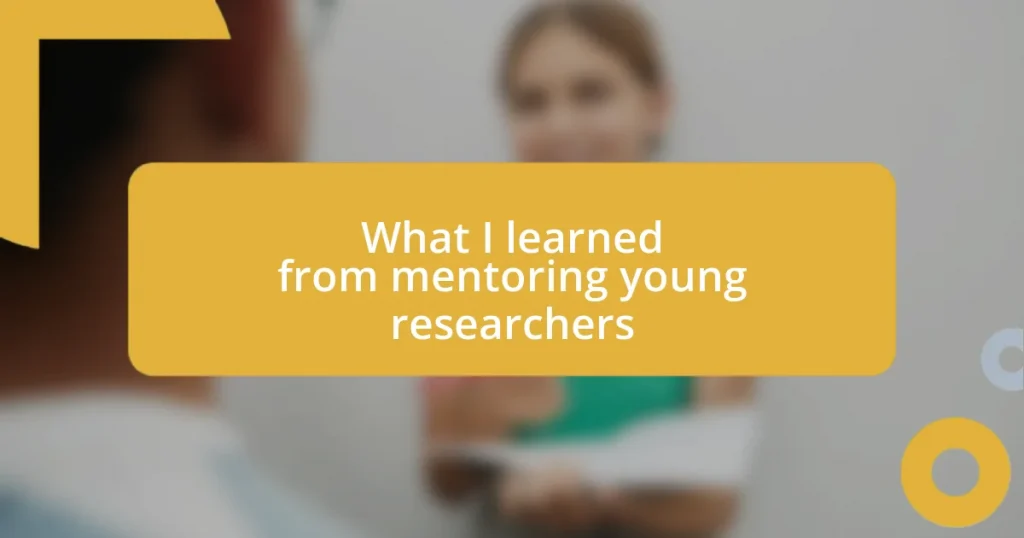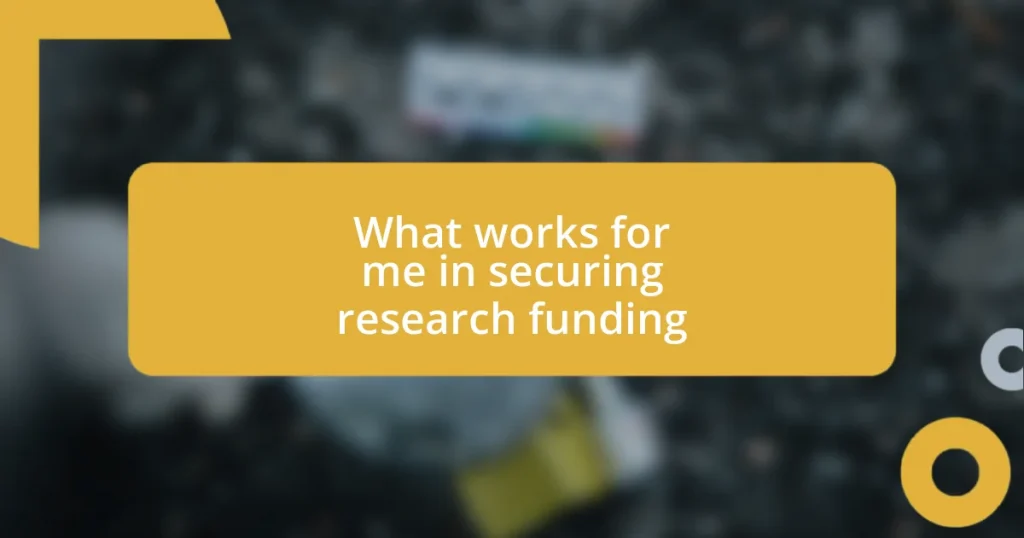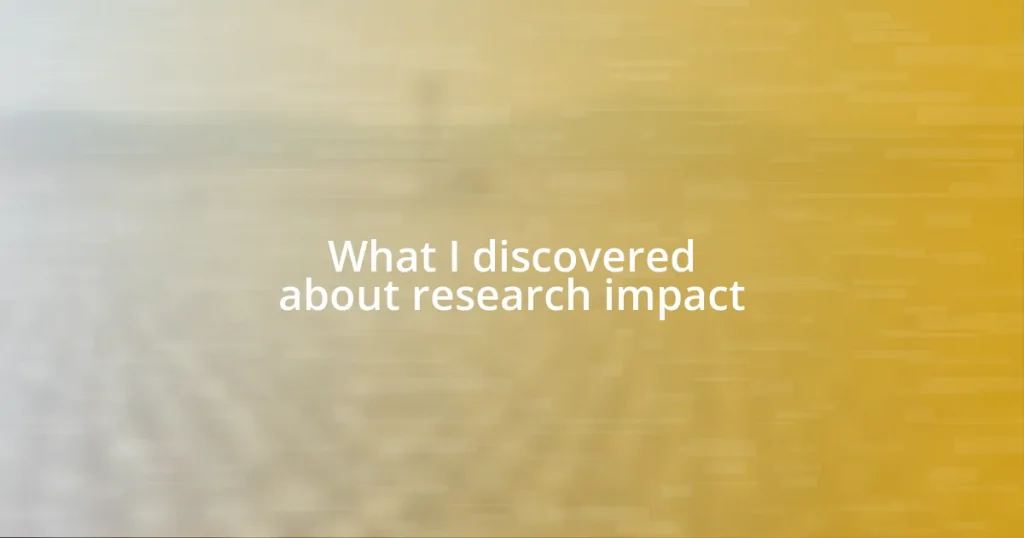Key takeaways:
- Mentoring fosters a supportive relationship that nurtures both the mentee’s growth and the mentor’s renewed passion for research.
- Effective mentorship involves active engagement, clear goal-setting, and celebrating small achievements, which boosts confidence and encourages independence.
- Success in mentoring is reflected not only in tangible outcomes like presentations and awards but also in the growth of mentees’ self-belief and empowerment through effective communication and feedback.
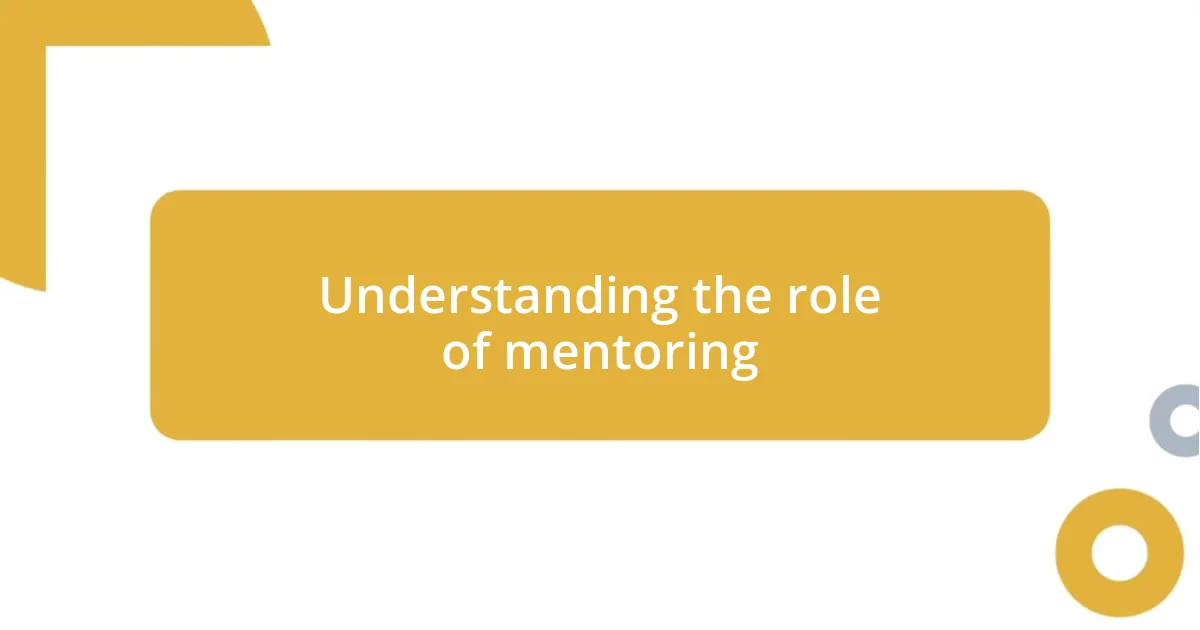
Understanding the role of mentoring
Mentoring acts as a bridge between experience and potential, fostering a relationship where guidance meets growth. I remember my first experience mentoring a young researcher who felt overwhelmed by the demands of their project. Seeing their confidence blossom over time was incredibly rewarding—not just for them but also for me.
In my view, the role of a mentor transcends academic guidance; it’s about nurturing curiosity and resilience. I often ask my mentees how they envision their research impacting the field. Their responses ignite a spark in me, reminding me of the passion that drove my own journey. This exchange of ideas creates an environment where both mentor and mentee can thrive.
Mentorship is also about emotional support. I once had a mentee break down after a failed experiment, feeling like they had let everyone down. I shared my own tales of failure and subsequent recovery, emphasizing that setbacks are a natural part of the research process. It’s moments like these that reinforce the bond between mentor and mentee, anchoring trust and understanding in their relationship.
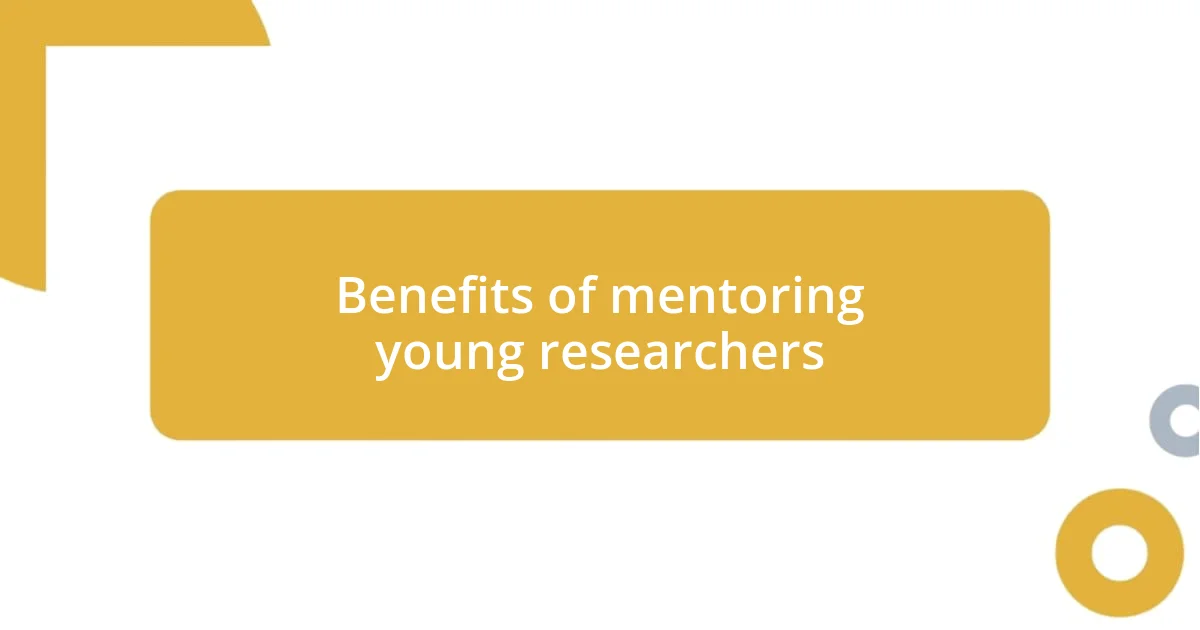
Benefits of mentoring young researchers
When it comes to mentoring young researchers, one of the most substantial benefits is the fresh perspective that emerges from these relationships. I recall a project where my mentee introduced an innovative approach that I hadn’t considered. This collaboration not only elevated their work but also revitalized my own thinking in the process. It’s incredible how sharing our experiences can lead to mutual growth and creativity.
Additionally, mentoring acts as a significant confidence booster for young researchers. I remember one of my mentees who struggled with presenting their findings. After several practice sessions and constructive feedback, they delivered a presentation that not only impressed their peers but also left them beaming with pride. Witnessing their transformation from anxious to confident is a reward that reinforces the purpose of mentorship.
Another vital aspect of mentoring is building a strong professional network. I’ve found that introducing my mentees to industry contacts can open doors they didn’t even know existed. One of my mentees got an internship through a colleague I introduced him to, which eventually paved the way for his full-time position. These connections empower young researchers, helping them to establish their paths in their chosen fields.
| Benefit | Description |
|---|---|
| Fresh Perspectives | Mentoring allows for innovative ideas to be exchanged, leading to mutual growth and creativity. |
| Confidence Building | Mentees gain confidence through practice and constructive feedback, transforming into capable professionals. |
| Networking Opportunities | Mentors can help mentees connect with industry contacts, opening doors for future career opportunities. |
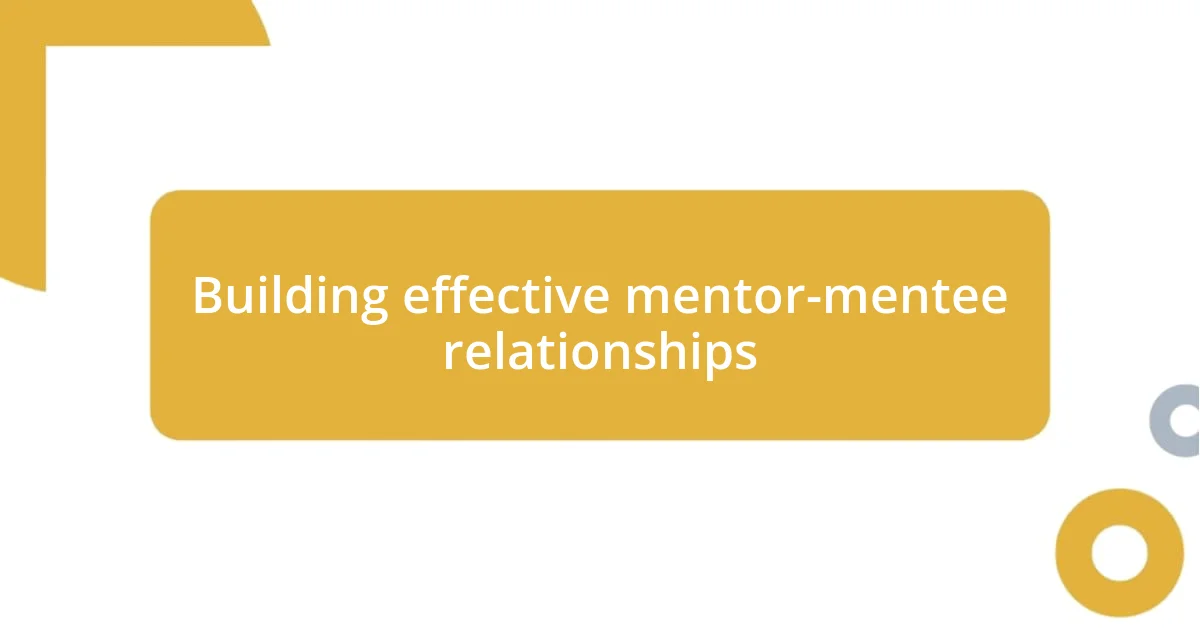
Building effective mentor-mentee relationships
Building effective mentor-mentee relationships hinges on openness and trust. I always strive to create a safe space where my mentees feel comfortable sharing their thoughts and challenges. For instance, during one of our early meetings, I encouraged a mentee to voice their concerns without fear of judgment. That moment opened the door for honest communication, which laid the groundwork for a strong partnership. It’s essential to foster this kind of environment to facilitate genuine growth.
To strengthen the mentor-mentee relationship, consider these key strategies:
- Active Listening: Engage deeply with what your mentee shares, validating their experiences.
- Regular Check-ins: Schedule consistent meetings to provide support and feedback, keeping the lines of communication open.
- Set Clear Goals: Collaboratively establish measurable, achievable objectives to guide your mentoring journey.
- Celebrate Achievements: Acknowledge milestones, no matter how small, to reinforce their progress and build their confidence.
- Be Approachable: Maintain a friendlier demeanor; being personable invites openness in communication.
In my experience, these strategies not only enhance the relationship but also promote a more enriching learning experience for budding researchers. Every mentor-mentee story is unique, and it’s these nuances that make the journey so fulfilling.
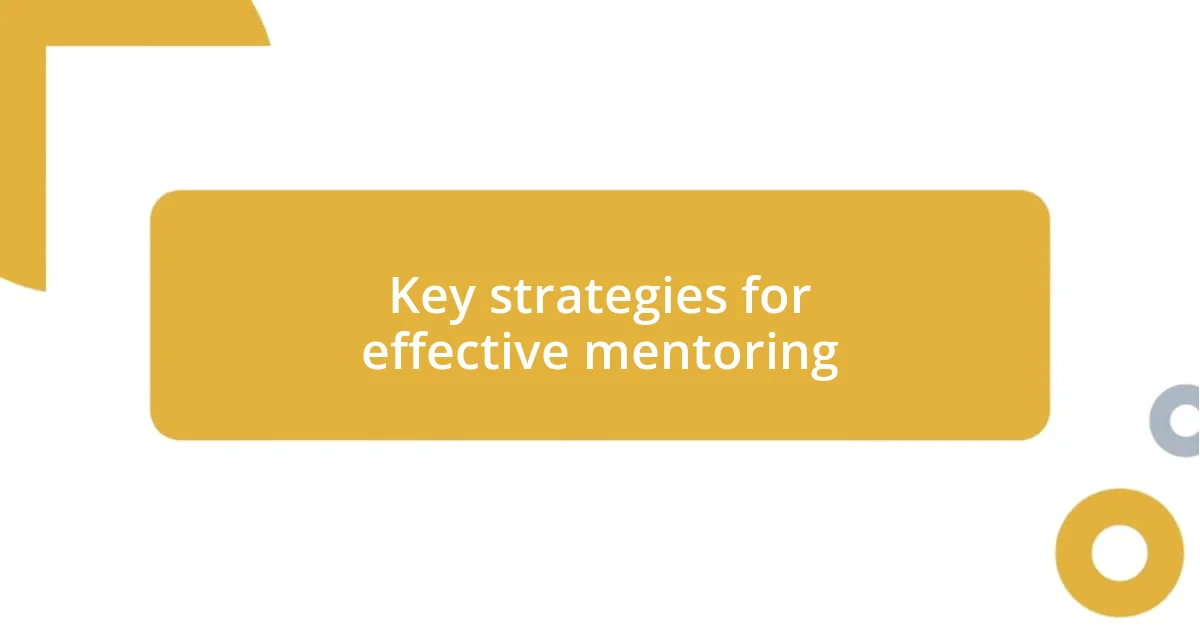
Key strategies for effective mentoring
One of the most effective strategies I’ve discovered for mentoring is the power of active engagement. During one of my sessions, I vividly remember when a mentee shared their frustration about a research hurdle. Instead of just offering solutions, I asked questions that prompted them to think critically about the problem. It really struck me how this approach ignited their passion and motivated them to explore alternatives. Isn’t it fascinating how simply listening and encouraging self-discovery can lead to profound realizations?
Another critical strategy I find invaluable is the practice of goal-setting. I worked with a mentee who felt overwhelmed with her research timeline. By breaking down her objectives into smaller, achievable milestones, we created a roadmap together. This not only provided her with clarity but also instilled a sense of accomplishment as she ticked off each goal. I’ve seen firsthand how structured guidance can empower young researchers, nurturing their confidence as they progress. It makes you wonder: how often do we underestimate the importance of setting clear, reachable targets?
Lastly, I’ve learned the importance of celebrating small victories. After a mentee successfully published their first paper, we made a big deal about it—complete with a small celebration over coffee! The joy in their eyes reminded me how significant recognition can be for someone starting their career. These moments reinforce their hard work and dedication, making them more eager to tackle future challenges. Have you ever noticed how acknowledgment can transform someone’s motivation? It’s truly rewarding to witness their growth and enthusiasm flourishes with each success.
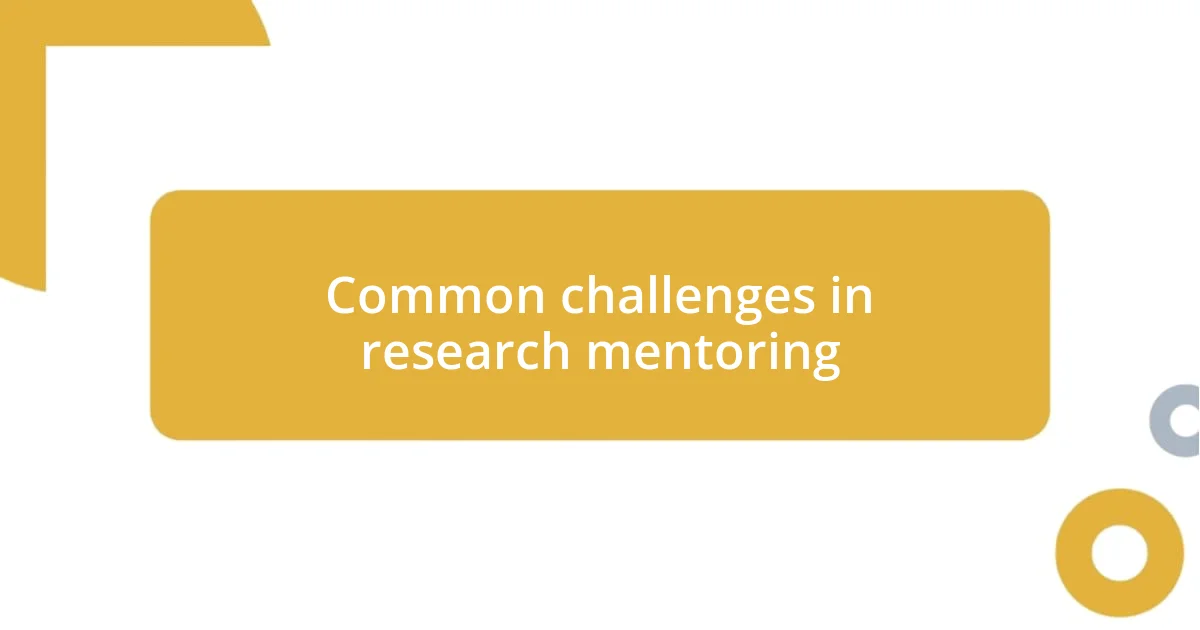
Common challenges in research mentoring
In my journey as a mentor, I’ve often noticed that one of the common challenges is balancing support with independence. For instance, I once had a mentee who frequently sought my input on every decision, which at first seemed flattering. However, I quickly realized that it stifled their ability to think critically. I began to gradually step back, encouraging them to make choices that felt right for their research. This shift not only helped my mentee grow more confident but also taught me the value of letting go.
Another difficulty lies in addressing diverse communication styles. I remember working with two mentees who approached problems very differently: one thrived on detailed discussions, while the other was more comfortable with succinct exchanges. This variance occasionally led to misunderstandings during meetings. To bridge this gap, I adapted my communication strategy, learning to read their cues better and shifting my approach as needed. It’s fascinating how becoming attuned to individual preferences can transform interactions, isn’t it? By doing so, I’ve fostered a more harmonious working relationship that benefits everyone involved.
Lastly, I’ve faced the challenge of navigating differing expectations. Early on, I had a mentee with a clear vision for their project, but it wasn’t aligned with the broader research goals of our team. This led to frustration on both sides. Through open dialogue, we reframed the project to meet both their ambitions and our collective objectives. I often reflect on that experience—how vital it is to ensure everyone is on the same page. It really makes me ponder: how do we effectively moderate our aspirations while remaining true to collaborative endeavors? Each of these challenges, while daunting, has ultimately enriched my mentoring experience and stretched my understanding of what it means to lead effectively.
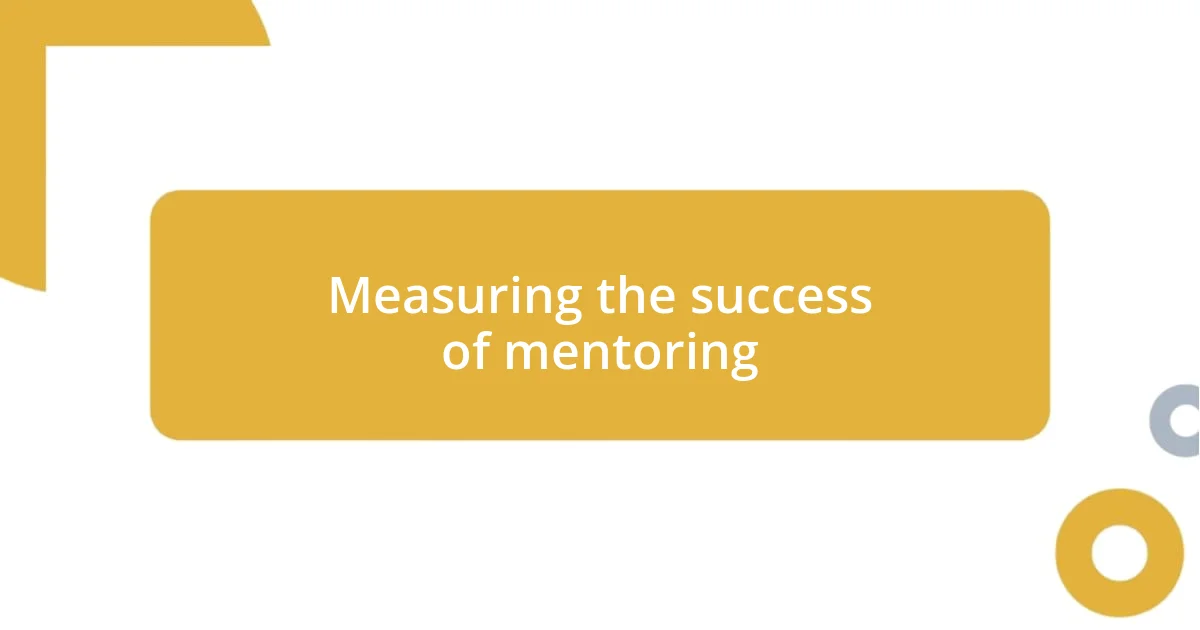
Measuring the success of mentoring
Measuring the success of mentoring can often feel subjective, but I’ve learned to look for tangible outcomes. One of my mentees, after months of guidance, achieved not only a successful research presentation but also received an award for it. Witnessing their growth was an emotional moment for both of us. It leaves me wondering: how often do we celebrate these milestones as indicators of success?
I also believe in the value of regular feedback sessions as a measurement tool. Early on in my mentoring journey, I initiated monthly check-ins with my mentees to discuss their progress and areas for improvement. In one memorable instance, a mentee expressed how the clarity from our discussions empowered them to tackle complex issues. This opened my eyes to how receptive they were – it’s not just about what they achieve, but how they feel empowered to strive for more. Isn’t it fascinating how communication can shape success?
Another important metric I track is the mentees’ confidence levels. There’s something incredibly rewarding about witnessing someone evolve from self-doubt to assertiveness in their work. A mentee once told me that she felt like a true researcher after defending her thesis—those words showcased a profound transformation. It makes me reflect on how success isn’t merely measured by accolades, but by the growth of self-belief. What more powerful testament to mentoring success is there than the blossoming of confidence in young researchers?
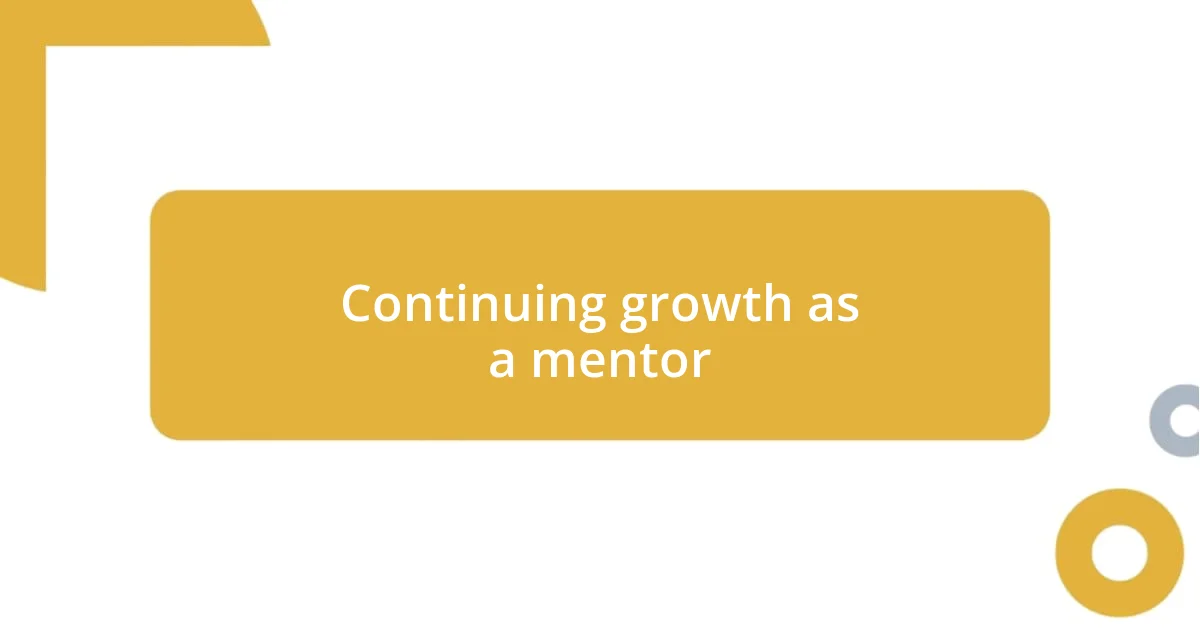
Continuing growth as a mentor
As I continue to grow as a mentor, I’ve learned the profound impact of staying open to feedback. I remember one of my mentees candidly suggesting that I could be more accessible during our sessions. Initially, I felt defensive—after all, I was trying my best. But upon reflection, I realized this feedback was a golden opportunity to enhance our collaboration. That’s when I began scheduling informal coffee chats to foster a more approachable atmosphere. It’s remarkable how a small adjustment can deepen trust and encourage openness.
Furthermore, embracing a mindset of lifelong learning has reshaped my mentoring approach. After attending a workshop on inclusive mentoring practices, I returned eager to apply what I learned. I implemented strategies to ensure that every voice in our group felt valued during discussions. The transformation was tangible; suddenly, every mentee began contributing ideas with confidence, which enriched our research. It leaves me thinking—how often do we seek out new knowledge to improve our mentorship?
Lastly, witnessing my mentees overcome hurdles inspires me on both personal and professional levels. There was one instance where a mentee struggled with a project setback, feeling disheartened and overwhelmed. I shared my own story of failure, emphasizing that setbacks are often stepping stones. Watching them gradually rekindle their motivation and produce remarkable work reignited my passion as a mentor. It’s these moments of shared vulnerability and resilience that really remind me why I embarked on this journey—how deliberate acts of support can foster growth not just for them, but for me as well.










